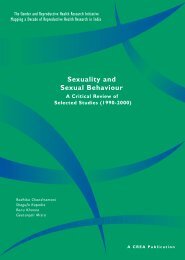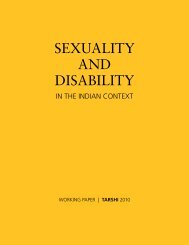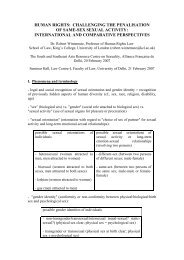People with Disabilities in India: From Commitment to Outcomes
People with Disabilities in India: From Commitment to Outcomes
People with Disabilities in India: From Commitment to Outcomes
You also want an ePaper? Increase the reach of your titles
YUMPU automatically turns print PDFs into web optimized ePapers that Google loves.
have comparative advantage is putt<strong>in</strong>g the experience and success s<strong>to</strong>ries of persons <strong>with</strong><br />
disabilities <strong>in</strong><strong>to</strong> the public arena. An important step <strong>in</strong> this regard is follow<strong>in</strong>g the guidance<br />
offered by people <strong>with</strong> disabilities <strong>in</strong> <strong>India</strong> on <strong>in</strong>teractions <strong>with</strong> disabled people, as outl<strong>in</strong>ed <strong>in</strong><br />
Chapter 2.<br />
Improv<strong>in</strong>g accessibility<br />
71. Improvement <strong>in</strong> accessibility for disabled people is a long run agenda, but several<br />
recommendations emerge. Firstly, both national and sub-national policies on promot<strong>in</strong>g access<br />
for people <strong>with</strong> disabilities should be required <strong>to</strong> <strong>in</strong>clude consultation <strong>with</strong> disabled people <strong>in</strong><br />
sett<strong>in</strong>g priorities, and <strong>in</strong> moni<strong>to</strong>r<strong>in</strong>g outcomes through access audits and other channels.<br />
Secondly, states and/or municipal authorities which have yet <strong>to</strong> amend their build<strong>in</strong>g bye-laws <strong>to</strong><br />
comply <strong>with</strong> the 1998 guidel<strong>in</strong>es should be encouraged <strong>to</strong> do so <strong>in</strong> the nearest future. These<br />
should allow for clear sanctions <strong>in</strong> case of failure <strong>to</strong> comply <strong>with</strong> accessibility standards, and<br />
adm<strong>in</strong>istrative clarity on official accountability <strong>in</strong> cases of failure <strong>to</strong> comply. MoSJE <strong>in</strong><br />
collaboration <strong>with</strong> Commissioner’s offices, the M<strong>in</strong>istry of Urban Development and Employment,<br />
and the states should also work <strong>to</strong>wards benchmark<strong>in</strong>g m<strong>in</strong>imum national standards of<br />
accessibility <strong>to</strong> which authorities could be held accountable. This will be a necessity under the<br />
new UN convention. Thirdly, public funds for the welfare of disabled people should also be used<br />
<strong>to</strong> support research on their access priorities, development of assistive devices for improv<strong>in</strong>g<br />
mobility of disabled people, implement<strong>in</strong>g cost-effective universal design, and analysis of the<br />
impacts and costs of failure <strong>to</strong> provide accessible environments. F<strong>in</strong>ally, university and <strong>in</strong>service<br />
tra<strong>in</strong><strong>in</strong>g courses for architects, eng<strong>in</strong>eers and planners should <strong>in</strong>clude exposure <strong>to</strong><br />
pr<strong>in</strong>ciples and practices of universal design and accessibility as a standard course element.<br />
F<strong>in</strong>anc<strong>in</strong>g for designated centres of excellence <strong>in</strong> this area should be made available.<br />
Strengthen<strong>in</strong>g Measurement and Surveys<br />
72. Improv<strong>in</strong>g measurement of disability is critical for understand<strong>in</strong>g the magnitude and<br />
scope of the disability issue <strong>in</strong> <strong>India</strong>, rais<strong>in</strong>g awareness of disability, and help<strong>in</strong>g address<br />
disability issues. This is a large agenda, but <strong>in</strong>itial recommendations are: there is a need <strong>to</strong><br />
harmonize def<strong>in</strong>itions of disability categories across NSS and census. In this process, there is<br />
also a need <strong>to</strong> improve and harmonize the approaches across disability types <strong>with</strong><strong>in</strong> each survey<br />
(detailed recommendations are <strong>in</strong> Chapter 1). Revis<strong>in</strong>g the NSS disability module for the next<br />
dedicated round, <strong>in</strong> particular improv<strong>in</strong>g PWD household consumption <strong>in</strong>formation and other<br />
welfare <strong>in</strong>dica<strong>to</strong>rs, and <strong>in</strong>clud<strong>in</strong>g other disabilities more explicitly <strong>in</strong> the survey would help<br />
improve measurement. It will also be necessary <strong>to</strong> <strong>in</strong>corporate disability questions <strong>in</strong><strong>to</strong><br />
ma<strong>in</strong>stream health, education and other surveys <strong>to</strong> an extent not done <strong>to</strong> date. This <strong>in</strong>cludes the<br />
ma<strong>in</strong> schedules of NSS, so that more reliable comparisons between the disabled and non-disabled<br />
populations on critical <strong>in</strong>dica<strong>to</strong>rs like educational atta<strong>in</strong>ment and liv<strong>in</strong>g standards can be made.<br />
xxix










